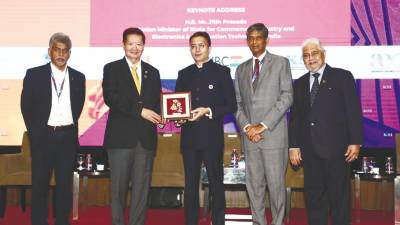KUALA LUMPUR: Malaysia is set to play a central role in advancing Asean-India economic ties as the Asean Chair in 2025, with leaders calling for bold new trade and investment targets to unlock opportunities in digitalisation, renewable energy, logistics and small and medium enterprises.
Asean-India Business Council (AIBC) co-chairman and National Chamber of Commerce and Industry of Malaysia president Datuk Seri N Gobalakrishnan said the timing could not be more significant as Malaysia assumes leadership at “a critical moment” in the regional economy.
“This year is particularly meaningful for us in Malaysia as we hold the Asean chairmanship. With this comes more responsibility and opportunity – the responsibility to guide Asean’s economic agenda at a critical moment and the opportunity to strengthen our cooperation with partners like India,” he said at the Asean-India Business Summit 2025 today.
He noted that Asean and India together represent nearly two billion people and a gross domestic product (GDP) of more than US$6 trillion (RM25.3 trillion).
“By aligning Asean’s priorities with India’s ambitious growth agenda, we can unlock new areas of prosperity that benefit not only our two regions but the wider global economy as well,” he added.
Gobalakrishnan pointed to India’s transformation into the world’s fifth-largest economy, with the potential to soon become the third largest. He said this shift opens new prospects for collaboration in the digital economy, renewable energy, logistics and SME development.
India’s Minister of State for Commerce and Industry and Electronics and Information Technology Jitin Prasada reinforced the call for stronger ties, describing the partnership as needing to be “resilient, connected and sustainable”.
“Together, Asean and India represent a community of two billion people, a combined GDP of nearly US$7 trillion and a youthful workforce ready to lead the global economy,” he said in his keynote address.
Prasada urged deeper cooperation in electronics, pharmaceuticals, agriproducts and healthcare, while highlighting new initiatives such as the Malaysia-India Digital Council and the India-Malaysia Startup Alliance, aimed at boosting innovation and entrepreneurship.
“A connected Asean-India is the foundation of shared prosperity and growth. Malaysia plays a very important part in this story. It is not a coincidence that Malaysia is also a country coordinator for the Asean-India Economic Framework,” he said.
He added that India was committed to building resilience by strengthening trade and supply chains, enhancing digital and people-to-people links, and ensuring sustainability through climate-conscious growth.
“Governments can create policies, but it is your vision, risk resilience and innovation that will make the Asean-India economic partnership the defining story of the Indo-Pacific,” he told business leaders.
Earlier, AIBC senior exco member and Asean-India Economic Council chairman Datuk Ramesh Kodammal said bilateral trade had already surpassed US$123 billion in 2024-25. However, there is still vast untapped potential in manufacturing, healthcare, renewable energy and MSME collaboration.
“Our partnership is a natural fit. The challenge now is to move beyond dialogue and create actionable pathways that deliver tangible gains,” he said.
Prasada also noted progress in interoperability of payment systems, cooperation in semiconductors and renewable energy, and scaling up commerce in traditional sectors such as agricultural commodities, petroleum, textiles and engineering goods.
Industry leaders added that Malaysia’s chairmanship presents an opportunity to drive breakthroughs in digital integration, green transition, and connectivity projects, such as the India-Myanmar-Thailand corridor.
